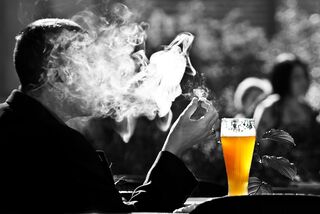Addiction
The Contradiction of Addiction
Is addiction a disease, a choice, or a form of powerlessness?
Posted February 8, 2021 Reviewed by Abigail Fagan

As an addiction specialist, one of the most common rebuttals I get from the general public and even those suffering from an addiction is the aversion to the belief of powerlessness. No one wants to feel "powerless" over a substance like drugs or alcohol or to behaviors like gambling, eating, or sex. We all want and inherently believe we make choices in life and need to be held accountable to them.
But therein lies the rub. The core definition of addiction is doing something which negatively impacts you and your loved ones yet you can't stop and continue to do so. So how do we make sense of the nature of addiction? Is it a disease, a choice, or are we simply powerless?
The original understanding of addiction was one of morality or lack thereof as it pertains to alcohol. In other words, addiction was due to a lack of morality (i.e. You're a bad person who engages in alcohol due to your own depravity). In the 1950s, the disease model of addiction sprouted and took root to help explain alcoholism as a medical condition of the brain as a means to destigmatize a person with addiction, so that individual realizes it's not because of a lack of willpower or one of morality. While this was helpful in giving us an understanding that brain chemistry impacts addiction, it also gives people the impression that addiction doesn't involve choice or responsibility, and people may make excuses for their behavior as one of genetics.
Since then, we have learned it's not about a person's inherent character or lack of integrity that leads to addiction, nor is it simply being born with a "bad" brain. Instead, we have learned there is a complex array of biological, social, and psychological factors that can predispose someone to addictions (i.e. trauma, family history, neglect, etc.).
So do people with addiction have a choice or are they simply controlled by their drug of choice? The answer is both. It's nuanced in the sense that before a person becomes addicted they did have a choice and "chose" to consume or engage in behaviors they found pleasure and/or relief in. But the choice is stripped over time with continual usage. In other words, they become enslaved to their addiction to the point that their brains and bodies have become dependent on the drug of choice to make them feel better.
In addiction recovery, it's important to let clients know they have control to break out of their addiction but to also to validate how they have lost control through the years and their brains and bodies have been hijacked, hence the seeming paradox and contradiction of addiction that one is both powerless and has control over it.
References
Sam's Coaching on Demand Service:
Life happens. You don't always have the time or luxury for a therapist. Get feedback, make tough decisions, and implement change in real-time.


